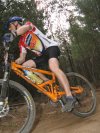You are hereForums / Preparation / Nutrition & Food / Nutrition for endurance events
Nutrition for endurance events
With the Highland Fling just around the corner thought I would post some information about nutrition. I am guessing most people will be looking at completing this event in 5-7hrs so you probably burn around serious energy during the day and if you don't get it right you may run out of juice before the finish line.
Your body gets energy from two main energy systems:
Anaerobic
Aerobic
Now depending on the intensity of the exercise depends on the percentage of each system it is using to get the energy from. As intensity does up it swings in favour of anaerobic and as intensity decreases, it moves towards aerobic.
During aerobic exercise, your body uses mainly fat as it’s harder to break down but you have almost infinite supply (well I do). During anaerobic your body wants lots of energy in a short period of time so it uses its glycogen stores in the muscles, blood and liver. Glycogen is basically stored sugar. You have about 1.5 hrs worth of glycogen in your body if fully fuelled. When you run low on glycogen you will basically bonk as you liver will have trouble maintaining your blood sugar levels and since your brain can only use sugars you will start to get foggy in the head and have an overwhelming sense of tiredness. You need to see your glycogen supplies as a precious source and use it wisely during the race. You can also reduce the amount of glycogen used by supplying your body with energy during the race i.e. eating/drinking.
Following are some strategies that may help you to get your nutrition right:
Pre-race nutrition
- Increase your carbohydrate intake 1-3 days before the events to about 70-75%
- Make sure you are well hydrated
- Eat breakfast on race morning or around 2-3g/kg body wait (wholemeal toast with jam/honey, banana, and Sports drink) about 2hrs before the event
Race nutrition
- You should drink 150-200ml of water or Sports drink every 10-20min so that your intake is not more than 1000ml (1L) per hour
- You should aim to ingest 1g of CHO /kg body weight/hour to 70g during race. So, if you weigh 70kg you need to eat/drink 70g of CHO per hour. This includes all CHO from food. squeezy or drink. Make sure that you drink water with the CHO to provide the necessary fluid for your stomach to process the CHO. If you weigh more than 70kg, reduce your CHO intake from the prescribed 1g/kg body weight/hour. If you take on too much CHO you will dehydrate as water is redirected to the gut to digest the CHO
- Drink cold fluids if possible as these are more easily used by the body
- Caffeine has a positive affect on performance. Drinking coke is not a bad idea as a source of caffeine as long as you maintain some other CHO intake
- Salt ? Research now suggests that sodium, being the main mineral lost through sweat, may be the main item that needs to be replenished to prevent cramping. An electrolyte drink containing sodium is therefore a good idea in longer races. Some people sweat more than others and may not be able to replace the volume of sodium lost via sweat by drinking a sports drink. In these cases salt tablets may be the best way to try to stave off the cramps
Don’t forget to test out everything during your training to make sure it works before you use it in a race.
Hope that helps and good luck.
Cheers,
Leigh.
- Login to post comments

Surfing the web the other day and came across a scary article that I thought should be shared with as many enduro riders as possible.
Go to www.beechworthchaingang.com/ click on the forum link at the bottom of the page and read Endurance Race Scare posted by Ross Cayley 11/10/2005
Good luck all with Urban Polaris and check your electrolyte drink!!
I suggest you eat more anchovies. Pizzas are the best form of increasing your anchovy intake, in my limited experience...